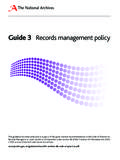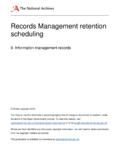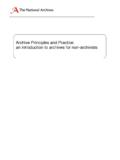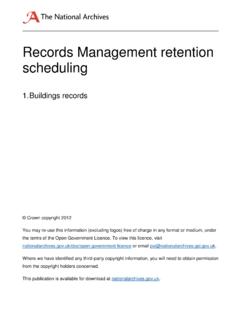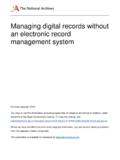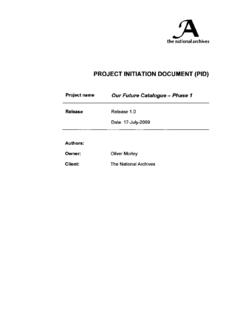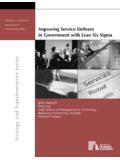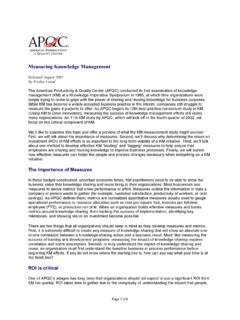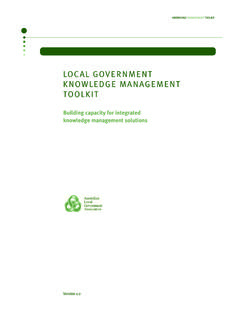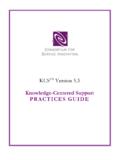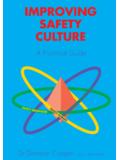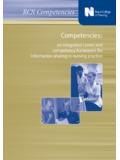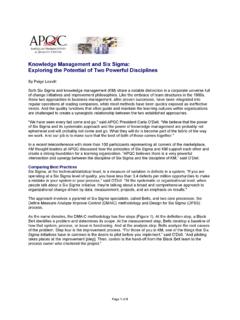Transcription of Knowledge Principles for government
1 1 Knowledge Principles for government July 2016 2 3 Table of Contents Foreword .. 4 Executive Summary .. 5 Why This Document Matters .. 7 How To Use This Document .. 8 Principles Overview .. 12 Principle 1 - Knowledge is a valued asset .. 14 Principle 2 - Knowledge needs the right environment in order to thrive .. 15 Principle 3 - Knowledge is captured where necessary and 16 Principle 4 - Knowledge is freely sought and shared .. 17 Principle 5 - Knowledge increases in value through re-use .. 18 Principle 6 Knowledge underpins individual learning .. 19 Principle 7 - Knowledge underpins organisational learning .. 20 4 Foreword The Civil Service is a Knowledge business. It uses its collective Knowledge to support the government of the day in implementing its commitments, delivering high quality public services and keeping the country safe.
2 Making sure we maximise the Knowledge of the Civil Service is something we are all responsible for. If we get this right we minimise the need to undertake expensive training or re-training as people move roles because the required Knowledge is transferred in advance of their departure. We avoid wasting time re-inventing wheels and the drag it causes on Civil Service productivity because the expertise needed can be easily found. The creative spark generated by good Knowledge sharing also helps departments to innovate to tackle the challenges they face. Civil servants are experienced in managing information, but Knowledge does not have the same characteristics and ensuring that it is shared effectively requires a different approach. Departments also differ in size, organisation and culture all factors which shape and constrain Knowledge sharing - and what works for one is not guaranteed to work for another.
3 This set of Knowledge Principles has therefore been designed by Knowledge and Information Management practitioners in government to assist their colleagues in developing strategies and plans to improve how Knowledge is shared in their departments. The Principles don t prescribe solutions, but instead provide a framework for considering the Knowledge sharing issues that need to be addressed if the Civil Service is to be a world-leading Knowledge organisation. As a result of the work I have been leading in government to address our information and Knowledge management challenges I believe we have the potential to become such an organisation. These Principles are a step on that journey and I commend them to you. Philip Rycroft 2nd Permanent Secretary, Head of UK Governance Group, Cabinet Office 5 Executive Summary The key part Knowledge plays in efficiently and effectively running departments is broadly well understood.
4 How to achieve this in more consistent, predictable and controlled ways is less understood and subject to a variety of approaches and strategies. The nature of government and the operation of individual departments of state make a single pan- government Knowledge management (KM) strategy impractical. The GKIM Knowledge Management Working Group (KMWG) has therefore produced a set of Principles intended to inform a common overall approach to individual departmental strategies, while retaining the ability to flex the detail. This is consistent with the approach taken to Information Management, and the two documents the Information Principles and this set of Knowledge Principles form a companion set. Knowledge is not Information, although Information Management Principles may be applied to captured Knowledge . Knowledge capture, however, must not be seen as synonymous with, or a substitute for, a holistic Knowledge management programme.
5 Knowledge is the sum of experience, training, insight and education and is tacit, whereas information is tangible, captured, manipulated in information systems and subject to further interpretation. Knowledge is fluid and dynamic, in a constant state of creation and renewal. Exploiting it to best effect for the individual and organisation is a challenge, but one where success can deliver benefits integral to adapting, improving and innovating. The need for robust and active KM is amplified as Crown Servants become more mobile and move posts more often, reducing the constancy of Knowledge and experience. The opportunity to share their Knowledge and exploit it to the betterment of organisations can help reduce rework, repetition of mistakes and improve delivery time and performance of projects. As shown here, the Principles build into a hierarchy, with the core Principle at the bottom.
6 If Knowledge is not valued, KM will not attract the level of resource required for success. 4: Knowledge is freely sought and shared 1: Knowledge is a valued asset 2: Knowledge needs the right environment in order to thrive 5: Knowledge increases in value through re-use 3: Knowledge is captured where necessary and possible 7: Knowledge underpins organisational learning 6: Knowledge underpins individual learning 6 Principle 2 recognises that whereas Information Management has tangible items to manage, KM relates to the intangible substance of a person or organisation s awareness. Managing Knowledge , therefore, is about working with people to create an environment where their Knowledge is given freely and where they are supported and encouraged to share with and learn from others. Principles 3-5 draw on this.
7 Large and geographically dispersed organisations are unlikely to consistently share Knowledge face to face. In order for Knowledge to be fully exploited and contribute to the benefit of the organisation, it must be nurtured and readily accessible. This requires techniques to socialise learning (eg through the concept of Communities of Practice); the application of social business software; mentoring programmes; and structured Knowledge -elicitation techniques such as exit interviews. The advantage of making Knowledge widely available is that organisations can exploit it to: avoid re-work, avoid repetition of bad practice / mistakes improve processes / ways of working In this sense, Knowledge increases its value by delivering benefit through sharing and re-use. Principles 6 and 7 build on the preceding ones as the foundation for individual and organisational learning, exploiting Knowledge at both the individual and organisational level to become more effective and efficient, increase capability and achieve greater impact.
8 It is intended that these Principles will be used by departments to inform discussions on Knowledge and form the central tenet of their Knowledge Strategies. 7 Why This Document Matters The Information Principles1 clearly identify that Information is needed to inform policy development and make evidence based decisions, and can be used to drive efficiency and service improvement enhancing public services , whilst at the same time reducing waste and improving value for money; the same is true of Knowledge . Information and Knowledge are inextricably connected in underpinning effective decision-making in government . Building on the Information Principles : Information is hard fact but the ability to use that information to deliver tangible effect comes from the way it is used by human beings; more specifically, how it is converted into Knowledge .
9 Learning lessons, preventing duplication of errors and effort in the workplace, cannot be done from information alone. To be done successfully, lessons-learnt exercises must incorporate people s experience, insight, skills and how they bring them all together and subsequently share them. Much of an organisation s capital and organisational advantage resides in the minds of its employees. The little tricks, workarounds, understanding, experience, background and skills in an organisation are rarely captured, yet these, as much as hard information, contribute significantly to organisational competence. People leaving the organisation and taking this know-how with them can have a significant impact on its efficiency and effectiveness. The public sector has historically benefitted from a stable workforce with on the job training, creating an environment where Knowledge has been passed on informally.
10 However, the current workforce is much smaller, more mobile and tends to move jobs more regularly, often taking hard earned Knowledge and experience with them. This is exacerbated by a demographic of people above their 40s and current staffing reductions which often result in older, more experienced people leaving. Given the importance of Knowledge to the public sector, there is clearly a need for greater access to the latent Knowledge of individuals, taking a strategic view on what Knowledge is vital and using state of the art methods and, where appropriate, technologies to ensure that Knowledge is effectively shared, captured and re-used. This document therefore presents, for the first time, an overarching set of Knowledge Principles for the UK public sector. These Knowledge Principles are intended to express timeless truths to which all public sector organisations can subscribe - but also to provide, as a corollary, concrete implications for organisations to consider when implementing KM programmes.

